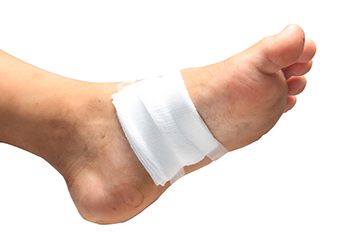
Diabetes can significantly impair wound healing, particularly in the feet, where the risk of complications is higher. Elevated blood glucose levels in diabetic patients disrupt vital healing processes that delay tissue repair. For instance, diabetes often leads to poor circulation, which reduces oxygen and nutrient delivery to wound sites and further slows healing. Diabetic neuropathy, or nerve damage, makes it difficult for patients to feel foot injuries, which allows wounds to go untreated and increases the risk of infection. Meanwhile, the immune system is often weakened by this disease, making it harder for the body to fight infections that can further delay healing. Regular foot checks and early intervention are essential to managing foot wounds for people who are diabetic. If you have foot wounds that will not heal, it is suggested that you include a podiatrist as part of your medical team for treatment.
Wound care is an important part in dealing with diabetes. If you have diabetes and a foot wound or would like more information about wound care for diabetics, consult with Dr. David Ungar from Personal Foot Care. Our doctor will assess your condition and provide you with quality foot and ankle treatment.
What Is Wound Care?
Wound care is the practice of taking proper care of a wound. This can range from the smallest to the largest of wounds. While everyone can benefit from proper wound care, it is much more important for diabetics. Diabetics often suffer from poor blood circulation which causes wounds to heal much slower than they would in a non-diabetic.
What Is the Importance of Wound Care?
While it may not seem apparent with small ulcers on the foot, for diabetics, any size ulcer can become infected. Diabetics often also suffer from neuropathy, or nerve loss. This means they might not even feel when they have an ulcer on their foot. If the wound becomes severely infected, amputation may be necessary. Therefore, it is of the upmost importance to properly care for any and all foot wounds.
How to Care for Wounds
The best way to care for foot wounds is to prevent them. For diabetics, this means daily inspections of the feet for any signs of abnormalities or ulcers. It is also recommended to see a podiatrist several times a year for a foot inspection. If you do have an ulcer, run the wound under water to clear dirt from the wound; then apply antibiotic ointment to the wound and cover with a bandage. Bandages should be changed daily and keeping pressure off the wound is smart. It is advised to see a podiatrist, who can keep an eye on it.
If you have any questions, please feel free to contact our office located in Farmington, MI . We offer the newest diagnostic and treatment technologies for all your foot care needs.

